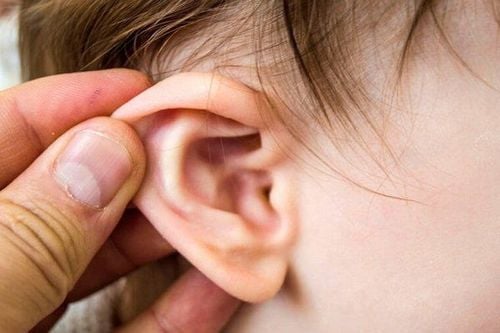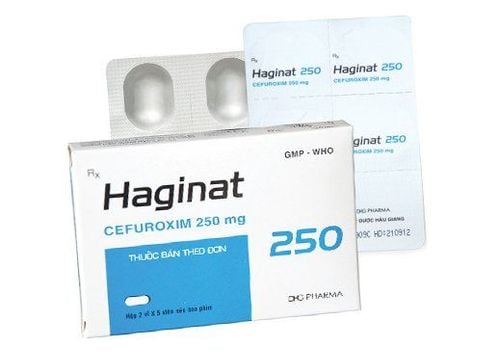This is an automatically translated article.
Meceta drug has the main ingredient is Cefalexin, belongs to the group of drugs used to treat parasites, anti-infectives, antivirals and antifungals. What are the uses of Meceta? How to use and what to pay attention to when using the drug through the following article.
1. Uses of Meceta
Meceta is used in infections caused by susceptible bacteria (not to treat severe infections) with the following specific cases:
Respiratory tract infections Middle ear infections Gastrointestinal infections Urinary tract infections, Genital tract, prostatitis, gonorrhea Skin and soft tissue inflammation Acute and chronic bronchitis Infectious bronchiectasis Mastoiditis Sinusitis Fossils tonsillitis, pharyngitis Mecete should not be used in the following cases :
Patients with hypersensitivity or allergy to cefalexin, cephalosporin antibiotics or any other ingredient in the drug. Patients with a history of penicillin-induced anaphylaxis or other severe reactions to IgE immunoglobulins.
2. How to use Meceta effectively?
Meceta is in the form of capsules and is for oral use. Dosage will depend on the age and medical condition of each patient. Dosage will be adjusted appropriately to provide the best treatment results.
Treatment of pharyngitis, tonsillitis: The usual dose is 1 tablet of Cefalexin, taken every 12 hours. Patients should take the drug for at least 10 days. Treatment of skin infections: The usual dose is 1 tablet of Cefalexin and every 12 hours. Treatment of urinary tract infections: The recommended dose is 1 tablet of Cefalexin every 12 hours and lasts for 7-14 days. For patients with renal impairment: the first dose of Cefalexin should be adjusted, then adjusted according to the creatinine clearance: If the creatinine clearance is between 11-40ml/min, a dose of 500mg should be used every 8-12 hours. Creatinine clearance from 5-10 ml/min should use 250mg dose every 12 hours and Creatinine clearance < 5ml/min should take 250mg dose every 12-24 hours. For children: the usual dose is 25 - 50 mg/kg/24 hours and divided into 3 - 4 doses. Children > 15 years old and adults: The usual dose is 1 tablet every 6 hours. The dose may be increased to 4 g/day for severe infections or for infections with less susceptible organisms. Patients using Cefalexin overdose can cause symptoms such as: Diarrhea, nausea and vomiting, neuromuscular hypersensitivity, seizures, ... especially in people with kidney failure.
In this case, the patient needs gastric lavage and respiratory protection with ventilatory support and fluids. Can drink activated charcoal many times.
3. Meceta drug interactions
When using Mecete with two or more other drugs, drug interactions may occur, specifically:
Probenecid Aminoglycoside Cefalexin used in high doses with Aminoglycoside drugs, Furosemide, etharynic acid, piretanide may adversely affect renal function. Combining cefalexin with oestrogens may reduce the effect of oestrogens in oral contraceptives. Co-administration of Cholestyramine with cefalexin slows down the intestinal absorption of the drug. Probenecid in combination with cefalexin increases serum concentrations and increases the half-life of cefalexin.
4. Side effects when using Mecete
During the use of Mecete, patients may experience some unwanted side effects as follows:
Digestive disorders Allergic reactions, rash, itching, urticaria Polymorphonuclear leukopenia Elevated enzymes Hepatic , cholestatic jaundice Eosinophils Headache, dizziness, fatigue Pseudomembranous colitis Inflammation of the liver, interstitial nephritis Diarrhea, nausea Eosinophilia The patient should inform the doctor all Undesirable side effects occur when taking Cefalexin .
5. Precautions when using Mecete
Mecete is generally well tolerated, but patients should read the instructions for use carefully or follow instructions from medical professionals. In addition, patients can refer to some cautions when using Cefalexin for treatment.
Patient has a history of or is allergic to penicillin. Patients with renal failure need to reduce the dose of Cefalexin appropriately. If cephalexin is used for a long time, it can cause overgrowth of non-susceptible organisms, patients should stop using the drug. When using Cephalexin, a false-positive reaction may occur when testing urine glucose with Benedict's solution, Fehling's solution or Clinitest tablets. Cephalexin was positive on the Coombs test. Cefalexin can cause some side effects such as headache, fatigue, dizziness, nausea. Therefore, people who drive, operate machinery, work at height need to be careful when using it. There are currently no data showing that the drug is fetotoxic and teratogenic. However, patients should only use Cefalexin when absolutely necessary and prescribed by a doctor. Very low concentrations of cefalexin in human milk have been reported. However, patients should still consider stopping breast-feeding while taking cefalexin.
Please dial HOTLINE for more information or register for an appointment HERE. Download MyVinmec app to make appointments faster and to manage your bookings easily.













